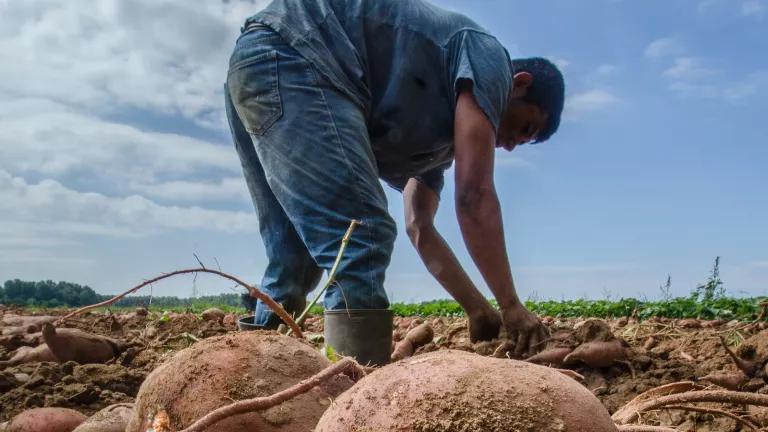A year ago, BP’s Deepwater Horizon rig exploded in the Gulf of Mexico, leaving 11 people dead, 1,053 miles of shoreline oiled, and 170 million gallons of Louisiana crude in the water.
It also left an economy in a shambles. Once-lucrative fishing and tourism businesses were devastated by the spill, and some Gulf residents are still struggling to feed their families.
New data has revealed the economic toll taken by the BP disaster. The numbers remind us that the true cost of oil is not just what we pay at the pump. It must also be factored in terms of lost jobs, lost income, and lost opportunities.
And yet the oil industry would have us believe it suffered greatly during the temporary moratorium on new drilling. The fact of the matter is: the Gulf produced 1.6 million barrels of oil per day last year—an all-time record.
And still the industry is clamoring for more. Though the current Congress has not passed a single piece of legislation related to the spill, the House is marking up three bills this week designed to expand offshore drilling in a way that sidesteps environmental safeguards. Sound familiar?
No, the oil business is not suffering. Soaring gas prices are filling company coffers and preferential tax status is greasing the wheels. Remember when you file your own taxes returns on Friday that the oil industry received $51 billion in federal subsidies and favorable tax treatment between 2002 and 2008.
The real victims here are those whose livelihood was robbed as a result of the oil industry’s culture of recklessness and the federal government’s failure of oversight. The number of people in need of restitution is staggering.
Claims: The Gulf Restoration and Protection Foundation Fund has paid claims to 343 oil rig workers affected by a temporary moratorium on new drilling in the Gulf. That’s not an insignificant figure, but the number of people outside of the oil industry is much, much larger. The Gulf Coast Claims Facility paid 174,172 claims to individuals and businesses who have suffered damages and costs related to the spill. That’s more than 500 times the oil industry claims.
Commercial Fishing Decline: Fishermen are still reeling. The Gulf of Mexico saw a 39 percent decline in commercial fishing landings overall between 2009 and 2010. This represents a $62 million loss in dockside sales. Statewide landing losses reached 52% in Mississippi, 50% in Alabama, 37% in Texas, 36% in Louisiana, and 24% in Florida.
Family Hardships: It also represents real hardship for Gulf families. In a new documentary airing on Planet Green and produced by NRDC called “Stories from the Gulf,” residents describe their financial struggles. Captain Darla Rooks says she and her husband must now live on their boat because they can’t afford to rent a home anymore. Others worry about keeping their businesses alive. Captain George Barisich says: “I was bred to be a fisherman. My boat survived Hurricanes Katrina and Gustav, but it may not survive this oil spill.”
Blow to Tourism: Many tourism businesses are also on the brink. The Gulf Coast Claims Facility has paid $1.5 billion in lost earnings claims from individuals and businesses in the hotel, food, rental properties, and tourism industries. According to a national survey, 29% of people with plans to visit Louisiana canceled or postponed their trip because of the oil spill.
In “Stories from the Gulf”, Ryan Lambert from Buras, Louisiana wonders how he can persuade visitors to return to the region. “After 30 years of building the largest guide business on the Gulf Coast, here we are down 90-something percent, we’re going to have to rebrand and put the perception that everything is fine. But how do you do that if you don’t know that it’s fine?”
The challenge of attracting tourists back to the region could impact thousands of workers. The oil industry may wield a lot of power in the Gulf, but recreation employs far more people: there are 84 jobs in the region’s leisure and hospitality industry for every 1 in the oil and gas sector.
What does the next tourist season hold for these workers? What will this spring mean for Gulf fishermen? Can residents keep up with their bills while they wait to see the long-term impacts of the spill?
There are daunting and painful questions for Gulf residents to confront. But these uncertainties will hover over coastal communities until America both strengthens the safeguards for offshore drilling and cuts back on the oil use that drives energy companies into ever riskier conditions (Transocean just set a world record by putting a drilling rig in 10,194 feet of water off the coast of India, deeper even than the 10,011 feet well it drilled in the Gulf in 2003.)
To prompt these changes, we are urging the president to implement the recommendations of the National Commission on the Deepwater Horizon Oil Spill, and we are calling on Congress to raise the liability limit so operators, not victims or taxpayers, are responsible for spill damages.
We are also advocating for a host of clean transportation measures. With the right policies in place, we can cut our oil imports almost in half in just 14 years. Why are we delaying when there is so much at stake?
We need to protect everyone—including the fishermen, restaurant owners, and tourism industry workers that rely on a clean, healthy Gulf to bring home dinner for their children and billions of dollars each year for the economy.


